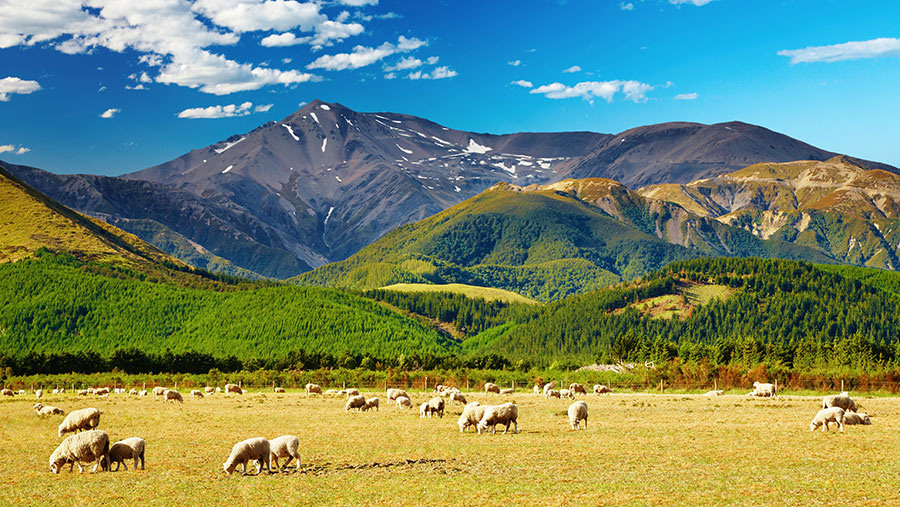Farm leaders fearful as Boris agrees NZ free-trade deal
 © Dmitry Pichugin/Adobe Stock
© Dmitry Pichugin/Adobe Stock The new free-trade deal with New Zealand is unbalanced and presents a significant threat to British farmers, the NFU has warned.
Prime minister Boris Johnson and New Zealand premier Jacinda Ardern reached the “agreement in principle” via a video call on Wednesday evening (20 October).
See also: Real impact of Aussie trade deal ‘to hit farmers in 10 years’
Under the deal, tariffs and red tape will be cut on trade both ways – making goods and services cheaper in both countries.
New Zealand has agreed to remove all tariffs from the day the agreement comes into force (yet to be finalised). This will benefit a range of UK goods, “from clothing and footwear to buses, ships, bulldozers and excavators”. Financial services and people will also benefit from easier access to New Zealand.
In return, the UK will also remove all tariffs on most goods from day one, but with some exceptions for sensitive agricultural products, which will have a longer (five- to 15-year) phase-out period – similar to the earlier free-trade agreement with Australia (see “What the deal says”).
“This is a great trade deal for the United Kingdom, cementing our long friendship with New Zealand and furthering our ties with the Indo-Pacific,” said Mr Johnson.
“It will benefit businesses and consumers across the country, cutting costs for exporters and opening up access for our workers.”
Reservations
But farm leaders have deep reservations.
“The announcement of this trade deal with New Zealand, coupled with the Australia deal signed earlier this year, means we will be opening our doors to significant extra volumes of imported food – whether or not produced to our own high standards – while securing almost nothing in return for UK farmers,” said NFU president Minette Batters.
“The fact is that UK farm businesses face significantly higher costs of production than farmers in New Zealand and Australia, and it’s worth remembering that margins are already tight here due to ongoing labour shortages and rising costs on farm.
“The government is now asking British farmers to go toe-to-toe with some of the most export-oriented farmers in the world, without the serious, long-term and properly funded investment in UK agriculture that can enable us to do so.”
Investments
Mrs Batters pointed out that both the Australian and New Zealand governments had made significant strategic investments in farming and exports in recent decades, which was not replicated by the UK government.
“This could damage the viability of many British farms in the years ahead, to the detriment of the public, who want more British food on their shelves, and to the detriment of our rural communities and cherished farmed landscapes,” said Mrs Batters.
The deal was more welcomed by Dominic Goudie, head of international trade at the Food and Drink Federation. He described New Zealand as “an important partner for UK food and drink, with trade in our sector’s products worth more than £661m in 2020”.
“Our manufacturers will benefit from an ambitious trade deal with New Zealand that removes a range of tariffs that currently constrain exports. Significant growth opportunities exist as UK production becomes more competitive in the New Zealand market.”
What the deal says
Sheepmeat
The UK will fully liberalise sheep meat after 15 years. During this time, a transitional duty-free quota will be made available to imports, as follows:
- Years 1-4: 35,000t/year
- Years 5-15: 50,000t/year
These annual quotas will only occur once New Zealand has used up 90% of its existing World Trade Organization sheepmeat quota into the UK.
This will give New Zealand a combined tariff-free access of up to 149,205t in year one, rising to 164,205t in years five to 15.
Any additional imports will be subject to full UK tariffs.
Beef
The UK will remove duties on beef after 10 years. During the first 10 years of the agreement, a transitional duty-free quota will be made available to imports of New Zealand beef, increasing in equal annual instalments, as follows:
- Year 1: 12,000t
- Year 10: 38,820m tonnes.
During years 11-15, a safeguard will be applied, increasing in equal annual instalments, as follows:
- Year 11: 43,056m tonnes
- Year 15: 60,000m tonnes.
If the trigger volume is met in a given year, the UK will apply a duty of 20% to any further imports.
Butter
The UK will fully liberalise butter duties in six equal reductions over five years.
During this time, a transitional duty-free quota will be made available, opening at 7,000t, building in equal annual instalments to 15,000t at year five.
Cheese
The UK will fully liberalise cheese duties in six equal reductions over five years.
During this time, a duty-free transitional quota will be made available, opening at 24,000t, building in equal annual instalments to 48,000t at year five.
Animal welfare
The final deal, once fully negotiated, will include chapters on animal welfare and the environment, setting out how New Zealand and the UK will uphold their respective standards and co-operate to promote them internationally.
